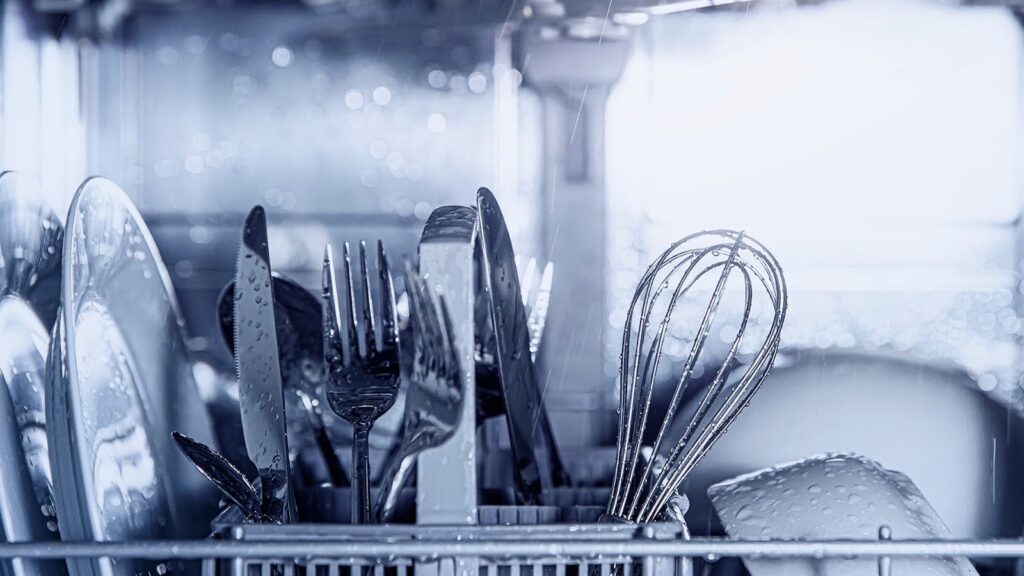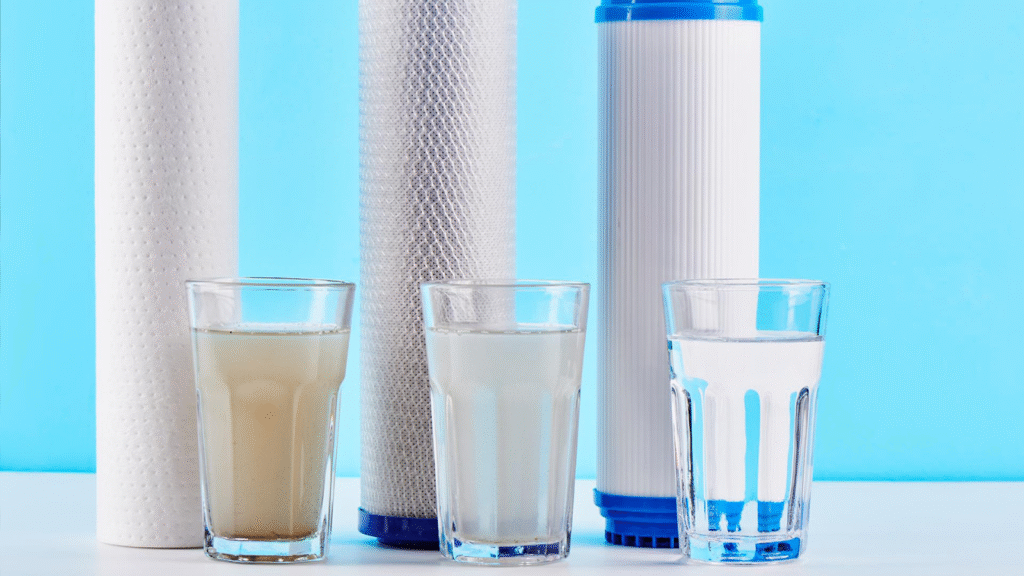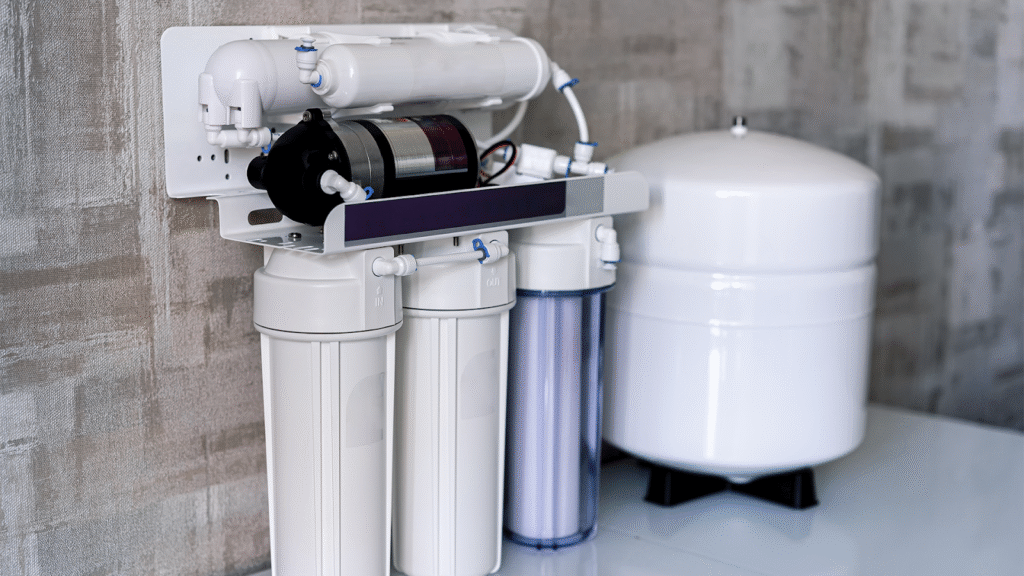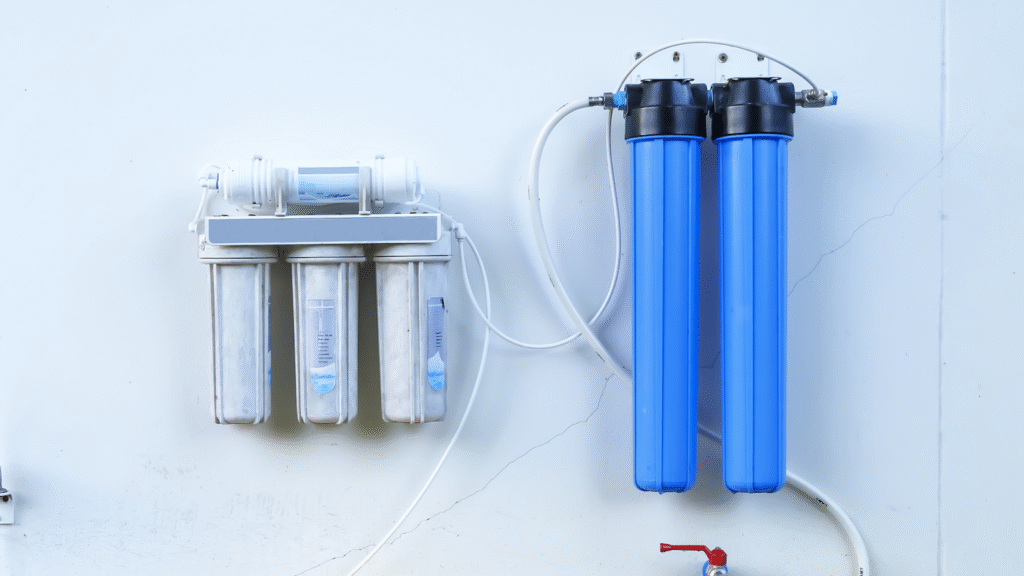Tired of pulling cloudy glassware out of the dishwasher? Frustrated that your clean laundry still feels stiff and scratchy? The culprit is likely Edmonton’s hard water. In this article, we’ll explain how soft water can be a game-changer for your dishes and laundry.

Table of Contents
ToggleThe Battle of the Spots: Hard Water vs. Your Dishes
Let’s set the scene: You host a dinner party, and as you pour wine for your guests, you notice the glasses are speckled with spots despite coming straight from the dishwasher. It’s embarrassing and frustrating. This scenario is all too common in Edmonton homes due to hard water. Here’s why hard water leaves those pesky spots:
- Mineral Residue: Hard water is loaded with calcium and magnesium. When water evaporates off a surface (like your dishes as they dry), it leaves behind the minerals that were dissolved in it – visible as white or whitish-gray spots and streaks. The hotter the drying, the more pronounced the residue can be, which is why high-temp dishwasher cycles or heated dry settings often result in more spots. Essentially, every drop of hard water that dries on a dish is a drop of minerals crystallizing on its surface. Learn more about different water softener technologies in Edmonton.
- Inadequate Rinsing: Hard water doesn’t rinse as cleanly as soft water. It can also cause dishwasher detergents to work less effectively, meaning some food particles or soap residues might remain and then show up as a film or spot once dried. This is why glasses sometimes come out looking hazy – it’s a combination of mineral film and leftover detergent that didn’t fully dissolve due to the water hardness. For choices on water softener types, check salt-based vs salt-free softeners.
- Etching and Cloudiness: Over time, those mineral deposits can actually etch into glassware, making a once-clear glass look permanently cloudy or milky. This is not just surface residue; it’s damage to the glass surface caused by the interaction of hard water and dishwasher heat/soap. Unfortunately, etched glassware can be difficult to restore. For choices on water softener types, check salt-based vs salt-free softeners.
Now, enter soft water into this picture, and the difference is night and day:
- No Mineral Deposits: Soft water has had the calcium and magnesium removed, so when it evaporates, there’s nothing to leave behind. Dishes come out of the dishwasher virtually spot-free because the water droplets simply dry without a trace. You’ll notice glasses are crystal clear, utensils have no water marks, and even plastics dry without that white film. It might feel like your dishwasher suddenly got a major upgrade, but it’s really the water that changed!
- Better Detergent Performance: Dishwasher detergents (especially the newer pod or tablet types) often contain built-in water softening agents because detergent manufacturers know hard water hampers cleaning. But these can only do so much. When your dishwasher is fed with naturally soft water, the detergent can work at full potency. That means fewer leftover food bits and soap residues clinging to dishes. Soft water also usually means you don’t need to use as much detergent or add rinse aid to achieve great results, which is a nice bonus. Explore salt-free water softening solutions like TAC systems if you want an alternative to traditional salt-based methods.
- No More Rinse Aid Dependency: Many households in Edmonton rely on rinse aid liquids to mitigate hard water spotting in dishwashers. With soft water, you may find that rinse aid is no longer necessary, or you can use the lowest setting. Water sheets off dishes and glasses more readily when it’s soft (because it doesn’t have those minerals making it sticky), so items come out dryer and clearer without chemical help.
Hard Water vs Soft Water: Dishwashing Results
Here’s a quick comparison to illustrate the difference:
| Dishes Outcome | Washed in Hard Water | Washed in Soft Water |
| Glassware appearance | Often spotty or hazy without hand-polishing. | Sparkling clear right out of the dishwasher, no polishing needed. |
| Dish surface feel | May feel a bit filmy to the touch sometimes. | Smooth and squeaky-clean feel. |
| Need for additives | Likely need rinse aid, maybe vinegar rinses for mineral film. | It may feel a bit filmy to the touch sometimes. |
| Dishwasher interior | Mineral scale buildup on walls, heating element, and racks over time (white crusty stuff). | Stays generally clean inside; no significant scale buildup, which also helps the appliance last longer and perform better. |
Laundry Woes: Why Hard Water Makes Clothes Rough and Dingy
If you’ve ever been disappointed that fresh laundry doesn’t feel as nice as you’d expect, hard water could be to blame. Edmonton’s hard water impacts laundry in a few key ways:
- Soap and Detergent Reaction: Those same minerals that leave spots on dishes also react with laundry detergent. The reaction forms a substance often referred to as soap curd or soap scum (similar to the bathroom film, but on your clothes). Instead of the detergent fully dissolving and rinsing out, part of it binds with minerals and can stick to fabric. This residue can make fabrics stiffer and less absorbent (ever notice towels not soaking up water well? Hard water might be why). It can also cause colors, especially whites, to appear dull or gray over time as layer upon layer of mineral-detergent mix accumulates in the fibers. or more on how soft water improves skin and hair health as well, see improved skin and hair health with soft water.
- Incomplete Soil Removal: Hard water’s minerals interfere with the cleaning action of detergents. Detergents work by lifting dirt and oils so they can be washed away. When minerals are in the mix, they partially hog the detergent’s attention, so to speak. The result can be that not all dirt is lifted, or some of it redeposits on clothes. Have you seen light-colored clothes gradually develop a yellowish or grayish tinge? That’s often due to hard water causing soil to redeposit and fabrics to get dingy. White socks or T-shirts, for example, may never look truly white, no matter how you wash them in hard water.
- Need for Fabric Softeners: Because hard water can leave clothes feeling rough, many people turn to liquid fabric softeners or dryer sheets to add some softness and reduce static. However, these products often just coat the fabric with a sort of waxy layer to fake a soft feel, which can build up too. It’s like layering one residue on top of another. What if you could have naturally soft clothes without adding another chemical layer? Soft water makes that possible.
Now, let’s see how soft water improves laundry day:
- Less Detergent, Better Cleaning: Soft water lets detergent do what it’s meant to do – clean your clothes – without fighting hardness minerals. You’ll likely find you can use much less detergent and still get great results (often manufacturers suggest cutting detergent amounts by 50% or more in soft water). Clothes come out truly clean because the detergent isn’t partially wasted bonding with calcium; it’s fully focused on dirt and stains. That means no gray film or lingering grime. Your whites stay white, your colors pop, and everything just looks brighter.
- Softer Fabric Texture: Without hardness minerals getting lodged in the fabric, clothing comes out feeling naturally softer. Towels fluff up better, and cottons feel more supple. That stiffness you felt before? It was essentially tiny rock particles and leftover soap stuck in the fibers. Remove those, and fabrics regain their natural softness. Many folks who switch to soft water are amazed that they don’t need fabric softener at all – their laundry is comfortable and soft to wear straight off the line or out of the dryer. This is especially beneficial for people with sensitive skin too, as eliminating fabric softener means one less chemical on your clothes (and thus on your skin).
- Brighter and Longer-Lasting Clothes: Because soft water doesn’t cause dingy buildup, your clothes maintain their original hues for longer. Reds stay redder, blacks stay black (not that weird rusty color black clothes can get after many hard water washes), and patterns remain vivid. Also, the fibers not being clogged or damaged by mineral deposits means your clothes actually last longer. It’s not uncommon for people to notice less wear-and-tear on garments when switching to soft water – fewer mysterious holes or thinning areas that sometimes are exacerbated by harsh washing conditions.
Hard Water vs Soft Water: Laundry Results
Comparing the laundry outcomes side by side:
| Laundry Outcome | Washed in Hard Water | Washed in Soft Water |
| Fabric feel | Towels and clothes can feel rough or starchy; jeans can be stiff. | Fabrics feel soft and gentle, even without fabric softener; towels are fluffy. |
| Color and brightness | Whites turn gray/yellow over time; colors can look dull or muddied. | Whites stay crisp and bright; colors remain vibrant through many washes. |
| Detergent use | Requires a larger dose of detergent; may need extra rinse cycles to try to get everything out. | Effective cleaning with a smaller amount of detergent; standard rinse suffices because nothing extra needs to be removed. |
| Need for softeners/boosters | Often use fabric softener, dryer sheets, or booster products (washing soda, borax) to try to counteract hardness. | No need for additional softeners or many additives; soft water alone ensures a good outcome. |
| Residue on the machine | A washing machine can develop scale and soap scum residue, especially around the drum and dispensers (that gunky stuff in the detergent drawer). | Washing machine stays cleaner internally, with minimal detergent buildup or scale, which also helps keep the machine odor-free and efficient. |
Additional Benefits: Easier Cleaning All Around
While dishes and laundry are major areas improved by soft water, it’s worth mentioning the ripple effect in the rest of your cleaning routine:
- Spotless Fixtures and Surfaces: Soft water means when you wipe down your sink, countertop, or shower, you’re not immediately greeted with new water spots as it dries. Cleaning chores become easier and less time-consuming because you’re not constantly battling the chalky aftermath of hard water. For example, glass shower doors remain clear with just a basic wipe – no need for special hard water stain removers or daily squeegeeing as a must.
- Shinier Car Washes: If you wash your car at home, using soft water can prevent those annoying water spot freckles that appear after the car dries. This is a small perk, but car enthusiasts know how big a difference the water quality makes when achieving a spot-free shine.
- Healthier Appliances: Your dishwasher and washing machine themselves will benefit from soft water, as mentioned. This keeps them running efficiently (tying back to energy savings) and prevents issues like scale-clogged jets in the dishwasher or film buildup that could cause odors in the washer.
A Day in the Life with Soft Water
To really illustrate the difference, let’s walk through a quick “before and after” of a typical day’s chores:
Before (Hard Water): You start your morning with a shower, noticing the glass door is streaked white no matter how often you clean it. You pour coffee and see a white ring in the pot from scaling. After breakfast, you load the dishwasher and later open it to find half the glasses need a hand polish. Laundry time – you pour a big capful of detergent and still your towels come out a bit scratchy, so you add fabric softener. Folding clothes, you see some white streaks on a black shirt (leftover detergent) and sigh, knowing you might need to rewash it. By evening, washing your hands leaves spots on the faucet. It seems never-ending.
After (Soft Water): Morning shower – the glass is clear, just needing a quick squeegee or wipe if you’re particular, but no crusty buildup. Coffee tastes the same, but you smile not seeing any scale buildup in the machine. Dishwasher load comes out and everything is gleaming; you simply put dishes away, no extra elbow grease needed. Laundry with soft water – you use half the detergent and skip fabric softener. Towels come out feeling great and smelling clean (soft water can also help them smell fresher because detergent buildup can harbor odors). Your favorite black shirt is truly clean with no streaks. Throughout the day, faucets and sinks stay shiny since every drop that dries doesn’t leave a mark. Cleaning tasks overall become lighter and more about simple wiping than heavy scrubbing.
It feels almost like cheating – chores become less chore-like, and you gain back time (and sanity).
Transform Your Home Chores with Water Softener Edmonton
If the “before” scenario sounds all too familiar, don’t worry – you’re not alone, and it’s not something you have to just accept. Hard water may be common in Edmonton, but the solution (soft water) is readily accessible and simpler than you think.
Water Softener Edmonton specializes in turning those frustrating cleaning battles into success stories. We provide and install top-notch water softeners that will supply your entire home with luxuriously soft water. From the kitchen to the laundry room to the bathroom, every faucet and appliance can start delivering the results you’ve been wishing for.
Our team will assess your water hardness and household needs, ensuring you get a system that’s properly sized and efficient. We handle everything from installation to explaining how to maximize your soft water benefits (like adjusting detergent use, etc.). The result? You’ll notice the difference the very first week – shiny dishes, gentler showers, and laundry that actually delights you when you take it out of the dryer.
Imagine actually enjoying the feeling of your clean clothes and being proud to set the table with your sparkling glasses. It’s possible, and it’s one call away.
Don’t let hard water continue to dull your home and your routines. Contact Water Softener Edmonton today for a free consultation or water test. We’ll help you solve the spotty dishes and scratchy laundry problem for good, with a reliable soft water system that brings the shine and softness back to your life. Say goodbye to hard water hassles and hello to a home that gleams!




